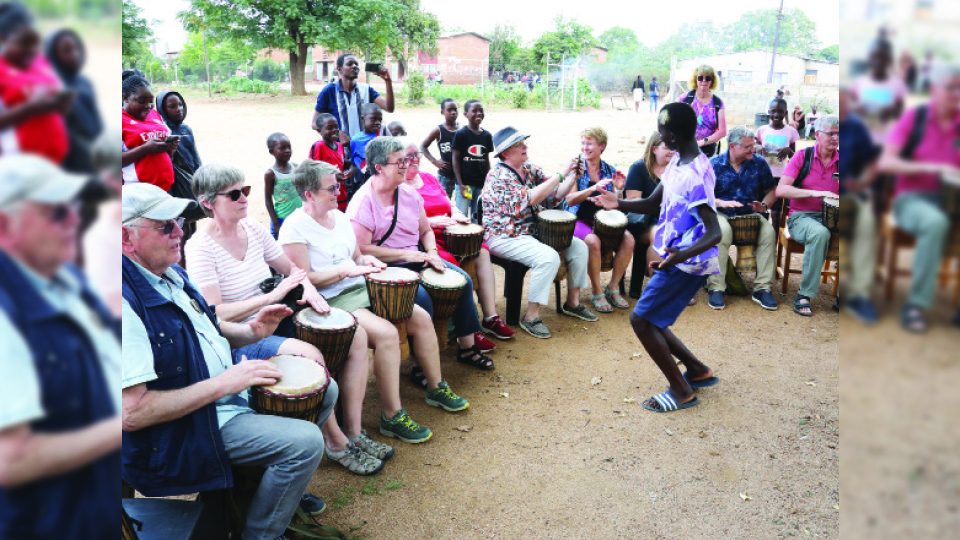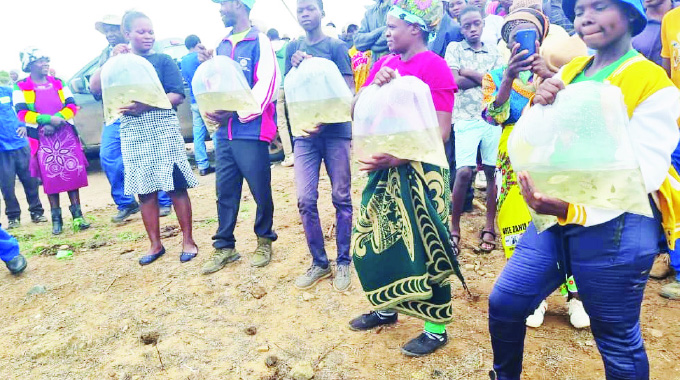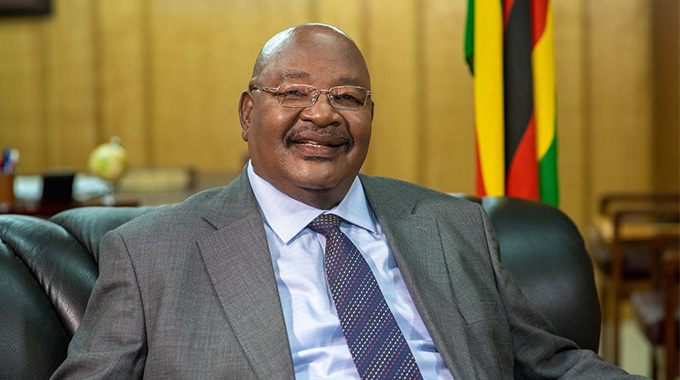Meet Zimbabwe’s first space lawyer

Mashudu Netsianda, Senior Reporter
SHE exudes charisma and confidence.
Her deep-rooted passion for law and love of space drove her to relentlessly pursue her dream of combining the two into one career to become a space lawyer.
A space lawyer supports governmental or commercial space activities by attending meetings and negotiations, drafting and reviewing documents.
Space law is the law governing outer space.
Meet Zimbabwe’s first and only space lawyer, Ms Ruvimbo Samanga (25) of Bulawayo.
She works at the United Nations Economic Commission for Africa as a consultant on geographic information systems (GIS) policy.
Ms Samanga said part of her job is to help come up with a Sadc regional policy framework and standards to help GIS practitioners to use GIS in a way that is beneficial and sustainable for development with particular specialisation in the traditional and New Space industry in Africa.
She said space technologies have a role to play in policy and legal affairs as they are a sector of human activity.
Article VI of the Outer Space Treaty designates responsibility to states in creating national space laws that legitimate their activities in outer space (Outer Space Treaty, 1967).
“Just like the activities we regulate through laws here on Earth, space too also has legal principles that need to be adhered to. Likewise, you will frequently encounter contractual law, environmental law, dispute resolution law and even intellectual property law as part of space law practice,” she said.
“As we know, any activity subscribes itself to norms and standards. Even as beings we live our lives according to our own precepts.
Likewise, technology laws and policies have emerged to better allow us to use technology and applications in a way that is safe, secure and sustainable, including through cybersecurity and data-sharing policies.”
Born in Bulawayo on November 6, 1995, Ms Samanga attended Whitestone Primary School and Dominican Convent Secondary School. She graduated in 2017 with an LLB degree with specialisation in law, psychology, criminology, sociology, anthropology, French and Spanish from the University of Pretoria.
She then pursued a second undergraduate degree with the same university in law, graduating with a Bachelor of Laws in 2018, specialising in Moot Court (a mock trial competition for law students), International Business Law, Alternative Dispute Resolution and Deeds & Notarial Practice.
In 2019 she attained a Masters in International Trade & Investment Law in Africa, specialising in Trade, Investment, Economics and Human Rights (University of Pretoria)
Ms Samanga serves as a research fellow at the Open Lunar Foundation, focusing her research on lunar settlement and development policy.
She was this year named by CNN as one of the three women shaping the future of the African space industry.
In 2019, she won the Zimbabwe Young Achiever of the Year Award and last year she was honoured by the UN Space Generation Advisory Council with the African Space Leaders Awards.
Ms Samanga was also awarded the Mandela Rhodes Scholarship in 2019. She has also been recognised as one of the top 10 Under 30 in the African space industry by Space in Africa, a Nigerian space consultant firm and was recently recognised as one of the Top Talents Under 25 in the world by Generation ZEO, a German magazine.
She holds a Masters in International Trade & Investment Law from the University of Pretoria and currently represents Zimbabwe in the Space Generation Advisory Council and the Women in Aerospace Africa Chapter.
She is also the founder of AgriSpace, an early stage Agri-tech startup developed in collaboration with the Ban Ki-moon Centre for Global Citizens, as a Ban Ki-moon Global Citizen scholar in residence.
AgriSpace is an agricultural services solutions provider for mainly small but also medium to large-scale farmers to adopt digital technologies to improve processes, boost their yield, increase profitability and assist to meet the growing global food demand by lowering the overall environmental impact of farming.
“AgriSpace is a geospatial solutions provider operating here in Zimbabwe using satellite data and geospatial technology to create modified farming solutions for farmers in drought-prone Zimbabwe. We hope to support food security by giving farmers all the necessary data and information that they need to optimize their farming production since Zimbabwe is an agro-based nation,” said Ms Samanga.
“What we do is that we take satellite data and use that to get farmers the information that they need to optimise their crop yields. We use various open-source data frameworks, and that data is then synthetised into our software which we place into a web-based platform for our farmers to use from any mobile device.”
Ms Samanga said she wants to set the pace for young people in the development of space ecosystems. “Being a traditional Government oriented and dominated industry, I really want to be a youth pioneer to develop this industry in a way that will benefit us in the future and will include us in the future,” she said.
A keen space enthusiast, Ms Samanga is also involved in various capacity-building and policy development initiatives in the global space sector.
“Space law is a very new field and unfortunately every time there is a new, developing and emerging economy, you will find practitioners who come in and set the standards. This is why as a space lawyer, I have invested so much time because this is my actual time to steer the narrative,” she said.
Ms Samanga said through her work at the UN, the idea is to use space in Africa for sustainable development in a way that is more beneficial and accessible to individuals and institutions on the continent.
“Space laws don’t tackle third-generation issues for Africa because they don’t really matter. When we are talking of third-generation issues, we will be referring to extra planet explorations, going to Mars and the moon and those are the things that shouldn’t be in our immediate scope,” she said.
Ms Samanga said while space is very feasible, there is a lack of space education, particularly in Africa.
“Whenever I encounter questions about space, I hear people say ‘oh, you are talking about rockets. Well, that is not the case, it really is a matter of sustainable development. We have come to use space in a way that is very ingenious in Africa,” she said.
“We have countries that use space for health care, telemedicine, mineral mapping, environmental management, wildlife monitoring, telecommunications. There is a broad spectrum of uses of space.”
Ms Samanga said the uptake of space in Zimbabwe will require re-skilling of the population.
“However, I am hopeful now that the Zimbabwe National Geospatial and Space Agency has been launched, we will see the new proliferation of space education and space policy in the country,” she said.
The national space agency was launched in 2018 as Government affirms its commitment to allow students and young professionals the opportunity to explore the space industry and use the knowledge to improve agriculture, disease surveillance and infrastructure.
Ms Samanga said despite Zimbabwe having established a space agency, the country including many other space-faring African countries, lack a coordinated Earth Observation (EO) legal framework.
“Such a policy would envision a common data and satellite sharing framework for Africa, investment in research and development in EO data capabilities and technologies, as well as capacity building through international collaborations.
“When I did my research in Zimbabwe, I found out that there are actually a lot of space professionals, people who are actually engaging in space systems but not knowing,” said Ms Samanga.
“If you log onto the internet, call someone, withdraw from the ATM, watch television, you are using a satellite system and these are the things that are well integrated into our society. The question is how can we use space in a sustainable way?”
“Law is the bedrock and foundation of all human activities. You need law to give you certainty, a structure and a strategy and I feel that law in Africa is very haphazard and has been left to allow certain individuals to capitalise, but at the end of the day, the law should favour even the lowest member of society.”
Ms Samanga said the best space faring countries in the world are the ones that began with policy which led to the establishment of the constitution of a space agency, which then launched a rocket or satellite.
“My interest in understanding water resource management came about during my formative years growing up in Bulawayo. Dry spells within the region were common and this resulted in a seasonal shortage of water supply,” she said.
“In 2020 when I became a Ban Ki-moon Global Citizen Scholar, I was privileged to meet a fellow Zimbabwean, Ms Tafadzwa Sachikonye, who was equally passionate about water resource management, and had founded a project known as Water Clix, which seeks to improve waste-water systems and management in urban settlements in Zimbabwe.”
She said she explored synergies between Water Clix and her own project, which incorporated space technologies for agriculture management.
“I wondered whether we might find use for GIS and remote-sensing in water management too, which of course we did. I am most excited to merge sustainable development for water management with space technologies, because it is scalable, environmentally friendly, and cost-effective in the long run,” said Ms Samanga.
“It also ushers Zimbabwe into a 4th Industrial Revolution (4IR) era and widens the scope for technological innovation in a previously technologically sheltered region. Working on the space laws and policies behind these interventions is empowering, because I am helping to lay the bedrock for these initiatives to find legitimacy and longevity as part of Government’s strategy for socio-economic development.”
Using her experience and personal journey, Ms Samanga is inspiring youths in Zimbabwe, especially girls to dream big and be able to achieve their goals.
Ms Samanga, with the help of a colleague, Marco Romero and in collaboration with InnovaSpace and Students for Exploration & Development of Space (Zimbabwe), have conducted a series of lectures on space and space-related themes, using interactive sessions, games, videos, comic books and other learning activities.
To spark space science and technology curiosity among the youth, they developed Astro Zimba Space Education curriculum for young children. Late last year, they launched a pilot study with the Whitestone School in Bulawayo.
“This space education curriculum recognises that building Zimbabwe’s space autonomy is hinged on the nation’s capacity to make a critical mass of skilled individuals. This capacity-building must necessarily begin from the early developmental stages,” said Ms Samanga.
“We come up with this programme in the hopes that more children, especially young girls, will be inspired to take up STEM subjects and careers. We identified a gap in existing curricula in terms of the development of the space industry.” — @mashnets.












Comments